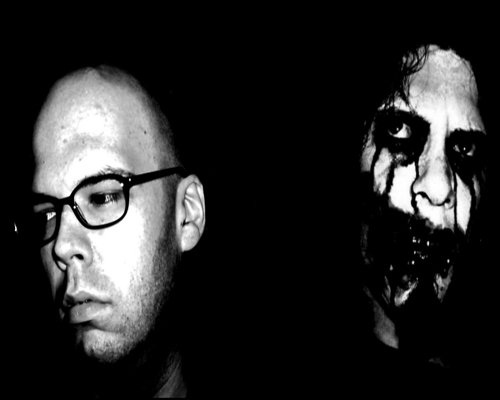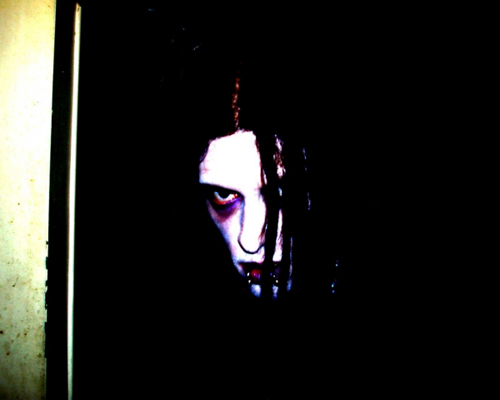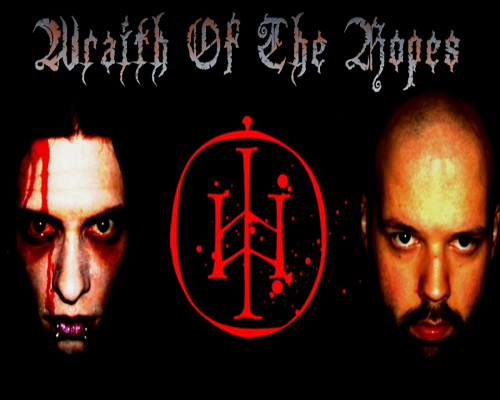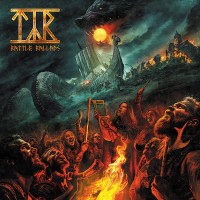Wraith Of The Ropes interview (12/2005)

| With: | E.M. Hearst[guitar, bass guitar,programming], Scarecrow Rottinghouse[vocals, keyboards, programming] |
| Conducted by: | KwonVerge |
| Published: | 21.12.2005 |
|
Band profile: |
Wraith Of The Ropes |

First of all I'd like to congratulate you for your fabulous debut album, "Ada", and for the chance of interviewing you as well!
SCARECROW: Thank you, it's our pleasure.
HEARST: Yeah, thanks. I'm glad you like the album.
Would you like to introduce the band to the ones that haven't heard of you yet with some history information?
HEARST: OK. My name is E.M. Hearst and i'm the guitarist, bassist, co-programmer and electronic percussionist/drummer for Wraith of the Ropes.
SCARECROW: I'm Scarecrow Rottinghouse, or Jack if you prefer. I'm the vocalist, keyboardist and co-programmer. Wraith of the Ropes formed in 2001, and since that time we've suffered through everything you can imagine: from technical problems to illnesses to broken relationships. The first five years of existence for the band was hellish, but it gave us time to decide what WotR meant to us, and now we know exactly where we stand as a band and exactly how to write each song. While listening to Ada, keep in mind that the recording process lasted for five years, and that it represents the birth of the band and not what we're currently capable of.
HEARST: Yeah, we started recording Ada in late 2001 but it wasn't finished and released until late 2005. When we started out, we were playing instrumental electronic Horror music (meaning music similar to what you'd hear in horror movies like Hellraiser, Halloween, Suspiria, etc...). It wasn't until much later that we added the Metal elements to our sound. People love to call us a "Funeral Doom" band, which we don't agree with. Our music was always slow, depressing and creepy (like most good Horror film soundtracks are) but once we added a guitar, all of a sudden we're considered a Funeral Doom band? There are similarities, I wont deny that, but at our core, we are still just playing Horror music. If you took the guitars away, it could still sound like a Horror movie soundtrack.
Your name is quite poetic and deeply mourning if you think deeply about its meaning, how did you conceive it?
SCARECROW: The true meaning of the name will remain a secret. We had many possible names, and Wraith of the Ropes was the one name that had a true meaning. It also gives the first glimpse of our sound, anyone who hears the name Wraith of the Ropes will at least have a vague idea of what they're getting into.
HEARST: I'm glad that you find the name so poetic and mournful. Whatever meaning the name has for you... that is the correct meaning! We want each person to decide for themselves what it means. It's probably much more interesting that way.
"Ada", it seems to be a female name to me, in fact, in Greek it is, what does it mean?
SCARECROW: Ada is the name of a girl we once knew that has passed away. I didn't know it was a Greek name, as far as I knew it was only Asian. Ada is also the Bulgarian word for Hell, which we also didn't know until recently, but it's a great coincidence considering the concept of the album deals with death, and what may await us after death.
HEARST: Many strange and unexplainable things have happened in the house where Ada died. It's actually the same house that Scarecrow lives in now. Sometimes when I visit that house, I can still feel her presence. It's impossible to tell if it's just my imagination or if she's really still wandering around in that house. Perhaps she doesn't realize that she's dead yet? Anyway, the album's title is a tribute to her. Wherever she is, we hope she's at peace.

The cover of "Ada" is quite artistic and desolate, pacing with your music and the name of the band. Is that female figure lying naked, exposing herself in the coldness of the ruins, a "wraith of the ropes"?
SCARECROW: The cover is a representation of Ada being portrayed by a model named Sicka. She has become a friend of the band now and isn't just a model letting us use her image. If all goes well, Sicka will be the cover model on our next release "Demonic Influence".
HEARST: It is indeed meant to be a depiction of a "wraith", or a wandering spirit, ghost or whatever else you want to call it. She's not necessarily the "wraith of the ropes" though. This is Ada, lost and confused... wandering through some cold and colorless Hell. The cover fits the mood of the music very well, I think. The artwork feels truly haunted, just like the music is truly haunted.
SCARECROW: We never intended for the cover to be viewed as a wraith of the ropes, but it's an interesting concept. My view of the cover is that she is a victim, a wandering spectre who's essence has been left behind after some great tragedy. In my opinion, a wraith of the ropes would have been a victim at some point, but has since become some horrid shadowed figure leaving victims in it's wake.
HEARST: Without Sicka's beautiful artwork, I don't think the album as a whole would've been as emotionally strong. We owe her a lot.
What someone can notice easily is the superb claustrophobic and haunting atmosphere of your music. The overall aesthetic of "Ada" is deeply nightmarish and has a horror movie-like feeling in the way the album flows and as it goes on the listener loses himself in your unearthly tunes more and more, finding himself in a place where his worst fears turn to life. Personally, I haven't found many doom bands that can evoke this trance-like eerie atmosphere which gives you quite a personal and unique sound. Unfold your thoughts on the atmosphere factor of the band, what does the term "atmosphere" mean to you in general?
SCARECROW: To tell you the truth, I've never heard anything that sounds like us, Doom or otherwise. If I had to compare the mood of our sound with something else, I guess I'd have to compare it to film scores. I'm sure other comparisons could be made, but I've never been much of a fan of Doom Metal, so I wouldn't know the similarities we share. I have to agree with your description though, I lose myself to the sound of the album, which is extremely gratifying considering I was responsible for half of it's creation. We've never tried to be a certain genre other than what we call "Horror Metal", that's what gives us our "personal and unique sound". As for the atmosphere, I generally try to create sounds that I would associate with oblivion, or the nether-world, as the backdrop to a song, and then try to create music that can co-exist with the world that the backdrop creates.
HEARST: Atmosphere and emotion really are the most important aspects of our music. Our greatest strength as a band is in creating these eerie, wraith-like, dream-like (or nightmarish) atmospheres. We want the listener to be transported into another realm, far away from this reality. This world can be a terrible place, we hope that we can help people transcend this depressing reality for awhile. Each listener may go to a completely different place in their mind, but our music can still help them reach that place. I can totally go into a trance and get lost in our music as well. Ada has some quality to it that drags you into a dark, surreal netherworld. I guess it's the same cathartic effect that you'd get from a good Horror movie.
This atmosphere is being evoked by every single instrument that participates in your sound and from the vocals as well; the distressing melodies of the keyboards/piano, the lurking sound of the guitars, the unearthly FX, the coldness of the rhythm section, the eerie vocals. How did you manage to harmonize so wonderfully together every single sound in the entity of "Ada", giving the impression as if nothing else would fit better in the overall outcome?
HEARST: Thanks for the compliment. As for how we harmonized every element... I don't really know for sure, it's just the way that we've always written songs, paying close attention to every detail.
SCARECROW: We have a vision for everything we do, and Ada called for a certain mood. There's no way to explain how we managed to mix the sounds so well, without being conceited, so I'll just say that we know exactly what we want our songs to sound like, and we know exactly how to achieve that goal.
HEARST: We also had half a decade to get everything right. We re-wrote the songs on Ada countless times over the past five years. We spent countless hours crafting every single little detail of the music. I guess you could call us perfectionists, and I think we may have went a bit overboard with the perfectionism on Ada.

I will remain on the atmosphere factor once again by putting in this question a reference to the production of "Ada". Your production is quite gloomy, dark and haunting as well, making the inspired compositions sound even greater, lending them what was remaining to be added so as to fulfill the special feeling of the album. How much time did you spend in the studio working on the production and final mix of "Ada" and how did the whole process flow?
SCARECROW: We've spent five long years working on Ada, not because we didn't know what we wanted, but because outside influences were keeping us from completing the album in any decent amount of time. Every time we thought we were finished with a song, something would go horribly wrong. Either something in our personal lives, or something technical such as entire recording sessions being lost due to faulty equipment.
HEARST: I have to say we're happy with the final sound of the album, even though it's probably not how it would sound if we re-recorded the album today. We have already evolved way beyond what you hear on Ada. The second album's sound quality will be much higher, but still very dark and atmospheric.
SCARECROW: We're also unable to afford the best recording equipment or instruments, so I'm sure that has something to do with the sound of the album. We don't have the luxury of having anyone hand us money for such things, we also have very little local support such as friends or family, we're two horribly ruined individuals proving everyone wrong that said we couldn't make it.
HEARST: As for the final mix: that was actually the easiest part of the whole process. It only took a couple of days to finish the mix for the whole album. I guess that's because after years of hearing these same 6 songs, we already knew exactly what we wanted the final versions to sound like. I don't think a good musician ever needs the best possible equipment to create something great. If anything, our limitations pushed us to be more creative and imaginative than many artists who have greater tools at their disposal.
Something I noticed on the album is the use of the various FX, they lend to it a slight industrial approach, not so much in terms of structure but as a feeling. What's your point of view?
SCARECROW: The Industrial sound can be attributed to our past. Our first band, Kindergarten, was an Electronic/Industrial band, with a small taste of the horror element. Kindergarten was heavily distorted, everything from the beats to the vocals had so many FX on them that the result was a rhythmic throbbing of voices and music. It was a great experience, and our first real attempt at creating something original. I guess a piece of Kindergarten will always be part of our sound.
HEARST: Yeah, we were playing Industrial music years before WOTR even existed. Industrial is the music that we grew up playing together, so it's not weird at all that a slight Industrial touch is showing through in our current music as well. Scarecrow and I have recently started another pure Electronic/Industrial project called Neo Hizumi. "Hizumi" was the name of the final demo recorded by Kindergarten back in 1998. So, "Neo Hizumi" can be seen as the continuation of that band. This new project is meant to carry on the memory and traditions of Kindergarten.
The album ends with an imposing and at the same time serene, having a sense of epic melancholy if I may say, composition, "Snow Dragon". After all this Hell the listener had to face through the first 5 compositions of the album I guess a song to reach catharsis was needed and in my opinion "Snow Dragon" works this way, to bring the calm back to the soul of the listener, all the peace that was violently broken. Sometimes instrumental compositions can tell much more than words and the absence of lyrics works in the most ideal way since the sounds speak for themselves. What's your opinion on instrumental pieces and my opinion on how I conceived "Snow Dragon"?
SCARECROW: I love instrumentals, and I wrote instrumental tracks for the two Kindergarten demos recorded years ago, and I thought Ada should be no different. I agree that Snow Dragon has a somewhat uplifting sound, but you might notice the musical subtext of loss that's hidden within the song. It's definitely less of a horror track than the rest of the album, but it has it's own message of despair and fear. Snow Dragon represents emotions I felt during the recording of Ada that weren't represented in the other songs. Ada is the soundtrack to the last five years of our lives, and each track represents the personal anguish we were living through. Snow Dragon is just the musical companion to a different kind of pain, and it's much less dark because a part of it also represents hope.
HEARST: I agree that Snow Dragon works to soothe the soul after all the bitterness and depression of the first 45 minutes of the disc. It is a welcome respite, even if it's not entirely a "happy ending". There is a certain sadness to that song that is much more subtle than the rest of the album.

Concerning the lyrics now, they are bleeding with loss of hope, despair, no light to shine on the horizon and they are written in a poetic and expressive way. They represent in written lines the absolute manifesto of desolation and the way they are being interpreted, along with the music, they lend another dimension to Wraith Of The Ropes. When do you feel the most like writing lyrics and what do they mean to you?
HEARST: All of the emotions expressed in our lyrics are real, we did not make anything up. We are not attention-seeking goths or angst-ridden teenagers, we are two truly miserable men who have had great despair in their lives. The lyrics are all very personal to us, but i'm happy to know that other people can relate to them in some way.
SCARECROW: I usually write lyrics when I'm going through a low point in my life, I'll write one or two lines as I dwell on the things I'm going through, and then maybe even weeks later I'll write a few more lines while thinking about the same subject, and eventually I have the framework for a complete set of lyrics for a track. To me the lyrics are my own way of expressing what I'm feeling, similar to a journal. I tend to not talk to anyone about my life, or what I'm dealing with, so I try to transfer that pain onto paper. It usually doesn't help, but at least the emotions are documented. The one somewhat hopeful track, "Snow Dragon", was written for (and dedicated to) Caroline, because she was there when I needed to vent in a more personal manner. It still contains a taste of the pain I was going through, but is also influenced by how much she helped me through a particular situation. That song didn't need lyrics, since I was able to say the words rather than writing them down.
You're a part of the funeral doom according to your sound, having a personal identity as well. How easy or difficult was it for you to keep a personal approach in your compositions, knowing that the scene doesn't leave many paths for innovation any more?
HEARST: It is very easy for us to remain individuals because we are only playing what comes naturally to us, like we've been doing for over 10 years now. We've never followed trends or cared about fitting into scenes. We are not really influenced by any other current bands (in Funeral Doom or any other genre) and we don't even think of ourselves as a Funeral Doom band. We think of our music as "Horror Metal" (that is: Horror film-music mixed with Metal). Ada just happens to be extremely depressive and slow, so it's lumped into the Funeral Doom scene. That's not such a bad thing, but it's not what we're really about.
SCARECROW: We didn't try to remain in any genre, we simply wrote for Wraith of the Ropes. The genre of "Ada" has been described many different ways, but it was never our intention to write a Doom album; the subject matter defined the sound. We wanted the music to match the mood that was set by the lyrics, and we decided to approach the Doom scene because we expected Doom fans to understand the music more than any other fan base. Our next album, "Demonic Influence", is planned to be released on Halloween of 2006, and will feature more Black Metal elements. It will have much less of a Doom Metal sound, but anyone that enjoys Ada won't be disappointed. We will always stay true to our vision, we will always create the Wraith sound, but that sound's boundaries are much wider than anyone with a closed mind could appreciate.
HEARST: Our second album will be even further away from the sound of any other existing bands, as we continue to develop and define the true "horror metal" sound. After hearing our second album, no one in their right mind will be able to call us a Funeral Doom band. What we really want to do is create an entirely new style and scene by ourselves. The "Horror Metal" cult is already starting to grow, slowly but steadily. Soon, there will probably be countless bands playing in our style, and they will call themselves Horror Metal too.

Which bands would you consider as personal influences and which good bands you came across during this period would you like to mention?
HEARST: The major bands that have inspired me personally are Black Sabbath, Goblin, Mercyful Fate and Skinny Puppy. Ada was influenced almost exclusively by Horror film scores. Our second album will have slight influences from Limbonic Art, Shining, Watain, Forgotten Tomb and early Ulver, but even though it will be influenced somewhat by Black Metal, we wont consider ourselves a Black Metal band at all. We are now, and will always be, a Horror Metal band.
SCARECROW: I personally enjoy Dimmu Borgir very much, and I've been a fan of Slayer for many years now. The only other current musicians I can think of are all film composers such as Danny Elfman, Howard Shore, and Harry Gregson-Williams. Further back, John Carpenter's work on "Halloween", and Goblin's work on Dario Argento films are also excellent. I usually don't listen to Doom Metal, but our label-mates Remembrance caught my ear with their album "Frail Visions".
HEARST: Yeah, I really love Remembrance's album. I believe they are the finest Funeral Doom band to come out in many years. Their music is extremely emotional and beautiful. I also love Moss, who are the exact opposite extreme of Remembrance... their music is brutal, sick and torturous! I can appreciate both extremes of modern Doom, but I must admit that there are very few modern Doom bands that appeal to me lately. I really love some "True Doom" stuff like Pentagram and Orodruin though. Really, there are too many bands that have inspired me over the years for me to list here. I have very eclectic tastes; I listen to everything from 1930's Jazz to modern Depressive Black Metal.
Is there a chance of Wraith Of The Ropes performing on stage? If so, what should someone expect from you while performing live?
SCARECROW: Yes, we definitely want to play live, and we're currently talking to a few musicians to help us with live shows. You can expect a lot of blood, images bathed in shadow, and different forms of rope rituals: from suspension to rope bondage.
HEARST: Yeah, our stage performances will be very theatrical; blood will constantly be flowing! I picture several nooses hanging around the stage, with simulated hangings and suicides going on while we play. We also want to create some interesting and disturbing video collages to be shown on screens behind us. We just want to put on an interesting show. It's not even worth seeing a gig if it's not something artistic, entertaining and memorable... otherwise, i'd just stay home and play the CD. It has to be an experience that the people will never forget, or there's really no point in doing it at all. That's our way of thinking anyway.
I guess this is the end of the interview. I would like to wish all the best for the future of the Wraith of the Ropes, a band that released, in my opinion, one of the best debut albums for 2005, offering a personal approach on funeral doom! End the interview in any way you wish?
SCARECROW: Thank you for all the kind words, you really seemed to enjoy the album and that means a lot to us. It's nice to have people appreciate originality, rather than criticizing us for not being what they would expect. You asked some great questions, some of which actually made me think more deeply about certain aspects of the band. Thanks again, and I hope we have the pleasure of talking with you again next Halloween. You can check out HTTP://LISTEN.TO/WOTR for all the news relating to Wraith of the Ropes.
HEARST: Demonic Influence is coming Halloween 2006, so prepare! I just hope that the Avian Flu pandemic doesn't kill us all before then. You can listen to some of our newer music on our Myspace page (www.myspace.com/wraithoftheropes). Join the Cult of the Wraith today and spread the gospel of Horror Metal! Hail Horror! Hail Metal Storm!
 | Posted on 21.12.2005 by "It is myself I have never met, whose face is pasted on the underside of my mind." |
Hits total: 4849 | This month: 6



